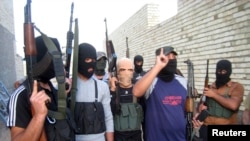U.S. President Barack Obama will meet with Iraqi Prime Minister Haider al-Abadi in Germany next week on the sidelines of a Group of Seven summit, the White House said Thursday.
The meeting follows ministerial-level talks in Paris this week (also attended by al-Abadi) to address foreign military support for Iraqi forces fighting Islamic State militants.
The United States leads an international coalition conducting daily airstrikes against IS targets, including eight in Syria and nine in Iraq overnight.
The Pentagon also has confirmed media reports that IS fighters are restricting water flow in Anbar province after seizing its capital, Ramadi, last month.
"There is not a large body of water behind the dam that, if destroyed, would cause a downstream flood or catastrophe," spokesman Col. Steve Warren told reporters Thursday. "But it does mean that if they restrict the dam it could have implications for farming and other activities. It's something we are keeping an eye on. It's an example of (Islamic State's) terror tactics."
Meanwhile, Islamic State militants have closed gates of a dam on the Euphrates River in western Iraq, reducing the amount of water flowing to government-held areas in Iraq's western Anbar province, an official said Thursday.
The militants have redirected the flow of water to their advantage on the battlefield around the city of Ramadi, which they captured last month. But the tactic also threatens southern provinces with drought and the water has been reduced to worrying levels, the officials said.
On Wednesday, the United Nations said it was looking into reports that the Islamic State group had reduced the flow of water through the al-Warar dam.
“The use of water as a tool of war is to be condemned in no uncertain terms,” the spokesman for the U.N. secretary-general, Stephane Dujarric said. “These kinds of reports are disturbing, to say the least.”
Dujarric said the U.N. and humanitarian partners will try to “fill in the gaps” to meet water needs for the affected population.
The reduced flow through the insurgent-held dam on the Euphrates River threatens irrigation systems and water treatment plants in nearby areas controlled by troops and tribes opposed to the extremist group, provincial council member Taha Abdul-Ghani told The Associated Press.
The Euphrates has acted as a barrier between the militants who control its northern bank and pro-government forces who are trying to advance toward Ramadi on the other side.
A spokesman for the governor of Anbar province, of which Ramadi is the capital, said security forces would now have to redeploy along the river to prevent the insurgents from infiltrating.
"Previously they had to monitor only the bridges and certain areas, but now all of the river will be crossable," Hikmat Suleiman said.
Water as a weapon
Islamic State militants have previously sought to use water as a weapon in its war against the Iraqi government.
Earlier this year, the Islamist extremists had reduced the flow through another lock outside the militant-held town of Fallujah. But they soon reopened it after criticism from residents.
Last summer, the militants seized the Mosul dam in northern Iraq and threatened to submerge Baghdad until Kurdish forces drove them back with the help of airstrikes from the U.S.-led international coalition.
The Anbar provincial council met Wednesday to discuss how to respond. Abdul-Ghani, suggested the government should bomb one of the dam's gates to release the water.
Residents of Ramadi and a local irrigation official said however the insurgents had left two of the dam's gates open, apparently to avoid flooding areas under their own control upstream.
The partial closure of the Ramadi dam has forced more water into a tributary running south to the Habbaniya lake, officials said.
Falih al-Essawi, a senior provincial security official, said the government had opened another dam to channel water from the Habbaniya Lake back into the Euphrates and prevent shortages in the southern provinces.
But he said this was only a temporary measure that would not be effective for more than three days.
UN seeks aid, attacks foiled
On Thursday, the United Nations appealed to the international community for half a billion dollars to maintain its operations in conflict-stricken Iraq, where a top official says humanitarian aid will be scaled back dramatically without further funding.
Lise Grande, the U.N. humanitarian coordinator for Iraq, says the financial boost is needed immediately to provide services to 5.6 million Iraqis until the end of the year.
“Humanitarian partners have been doing everything they can to help, but, more than 50 percent of the operation will be shut down or cut back if money is not received immediately,” she said at the European Parliament in Brussels on Thursday.
The organization is asking for $497 million to pay for shelter, food and water for the next six months as more Iraqis are displaced by fighting between Islamic State militants and government forces.
Also, Iraqi security forces used anti-tank missiles to repel suicide bombers driving explosives-rigged vehicles who attacked two military bases west of Baghdad, an army officer told the French news agency AFP Thursday.
Islamic State fighters attacked a base north of Fallujah with two explosives-rigged vehicles driven by suicide bombers, and another south of the city with four more, including a bulldozer, an army colonel told AFP.
Last month, Islamic State fighters used an unprecedented wave of truck and car bombs when it seized Ramadi, west of the capital, Baghdad, after which the U.S. said it would send 2,000 anti-tank systems to help repel such attacks.
The day before, an air strike in northern Iraq destroyed one of the Islamic State group's largest car bomb factories, which may help to curb one of the jihadists' deadliest tactics, officials said.
VOA White House correspondent Aru Pande and Pentagon correspondent Carla Babb contributed to this report. Material for this report came from Reuters, AFP and AP.







